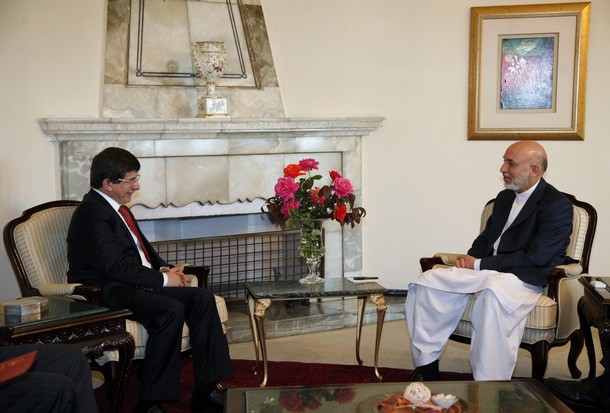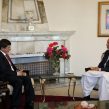
Turkish Foreign Minister Ahmet Davutoglu Visits Pakistan and Afghanistan
Publication: Eurasia Daily Monitor Volume: 6 Issue: 115
By:

Turkish involvement in Pakistan and Afghanistan has mainly developed as a result of Ankara’s own initiatives. Recently, however, the U.S. requested that Turkey enhance its security assistance to Afghanistan and Pakistan. The Chairman of the Joint Chiefs of Staff Admiral Mike Mullen, asked the Turkish Chief of the General Staff General Ilker Basbug to help the Pakistani military. Basbug stated that the Turkish military has provided such assistance over a long period, but if the Pakistani army wants additional support Turkey will meet this challenge (Voice of America, June 5).
Similarly, Turkish Foreign Minister, Ahmet Davutoglu, during his visit to the United States in the first week of June said that American officials explored Turkish views on Pakistan and Afghanistan. Davutoglu noted that these interlinked issues are amongst the most pressing concerns of neighboring countries, and must be viewed as a challenge confronting the international community. Indeed, while Davutoglu was en route to Kabul, Barack Obama’s national security advisor Jim Jones telephoned him to discuss these regional issues (Referans, June 13).
As part of the NATO Alliance Turkey is concerned about developments in both Pakistan and Afghanistan, and constantly monitors the security situation. Davutoglu said that the Turkish military unit in Afghanistan, starting from November, will command the International Security Assistance Force (ISAF) in Kabul. Turkey has pledged $200 million in aid to Afghanistan and $5 million will be spent to increase security for the upcoming elections (Zaman, June 5).
After his visit to Washington, Davutoglu traveled to Pakistan and Afghanistan for a four day visit. He outlined several points to explain Turkey’s involvement in the region. First, Turkey has launched a humanitarian aid program to help 3 million internally displaced persons in Pakistan’s Swat valley. During its service as a member of the U.N. Security Council, Turkey will continue supporting Afghanistan and Pakistan. It is organizing a meeting for the Allies of Pakistan Group, which was formed by the international community to help promote democracy and develop the economy of Pakistan. Ankara will also host a ministerial level meeting between Pakistan and Afghanistan in the coming months. It will bring the neighbors of Afghanistan together in order to explore ways of assisting the country. Turkey will host an economic cooperation meeting for Afghanistan in 2010. Finally, in November the Turkish military will assume the command of ISAF in Kabul (www.tgrthaber.com, June 8).
Davutoglu emphasized that Ankara considers Pakistan and Afghanistan as strategic partners and sees no differences between their ruling or opposition groups. Turkey wants to facilitate democratic elections in Afghanistan in August (Ihlas Haber Ajansi, June 8).
It appears that the Turkish government has opted to use its "soft power" as part of its strategy to become more proactive in this region. For instance, Turkish education and health institutions already actively function in 27 of the 34 provinces in Afghanistan. In the last three years Turkey has completed 550 social projects within the country, and around 7 million Afghans have utilized these facilities. Approximately 44,000 Afghan students are attending schools either directly run by Turkish companies, or the school facilities were built using Turkish assistance (Referans, June 14).
Davutoglu has finally found the right tone to establish dialogue with the different segments of the Afghan and Pakistani societies. He stresses the historic connections between Turkey and the Pakistani people, and of course their sharing the Sunni-Hafifi-Sufi tradition with the majority of Pakistani and Afghan people. Davutoglu originates from the province of Konya, where Mevlana the founding father of the Sufi tradition preached – who is extensively followed in modern Turkey. He modified his itinerary in order to visit the birth place of Mevlana in Afghanistan (Radikal, June 14).
The question remains as to how Turkey’s "soft power" will help the international community in the long term to lessen the violence in Afghanistan and Pakistan. In the meantime, Ankara will send additional troops to Afghanistan to maintain the security of Kabul, carrying out a military police function in the capital.
General Basbug first suggested that Turkey will hold the ISAF command in November, during his recent visit to Washington. The two other international brigades belong to France and Italy. They want to redeploy to the regions in the east and south. When they redeploy their troops, the gap will need to be filled by Turkey. Turkey will seek additional troops from NATO, however if the gap cannot be filled by other countries, Ankara will increase the size of its deployment of around 800 troops in Afghanistan -with the caveat that its forces will not participate in any counter-terrorist operations (Zaman, April 29).
Despite choosing to avoid any mention of strengthening the country’s military commitment during Davutoglu’s visit to Afghanistan, it is likely that Turkey will send additional troops once it assumes the ISAF command in Kabul. However, the political environment within Turkey is not ready to discuss this possibility, though in the coming months the debate might emerge as a major issue in the country’s domestic politics.




